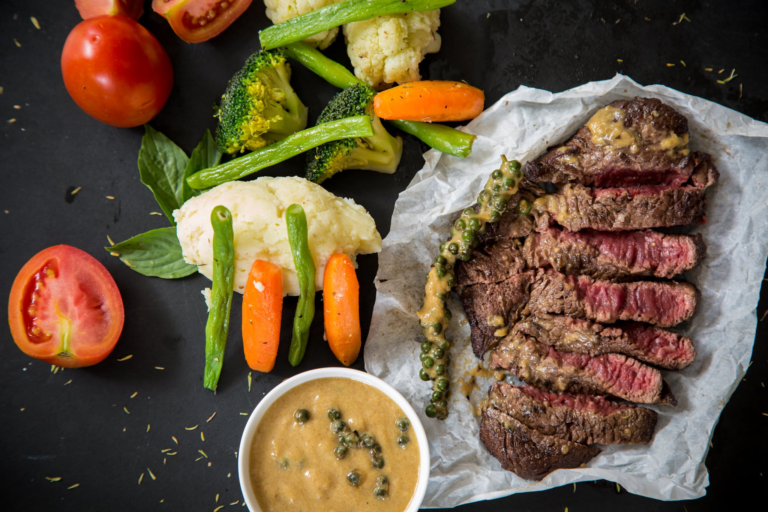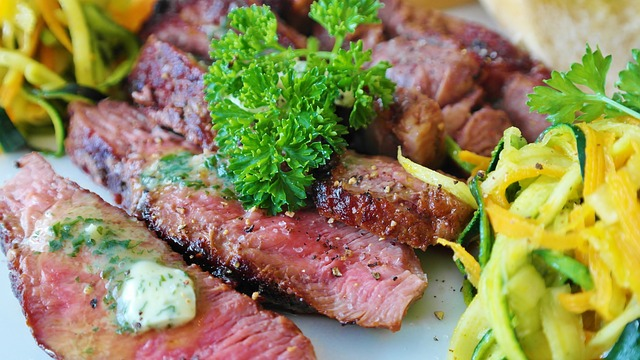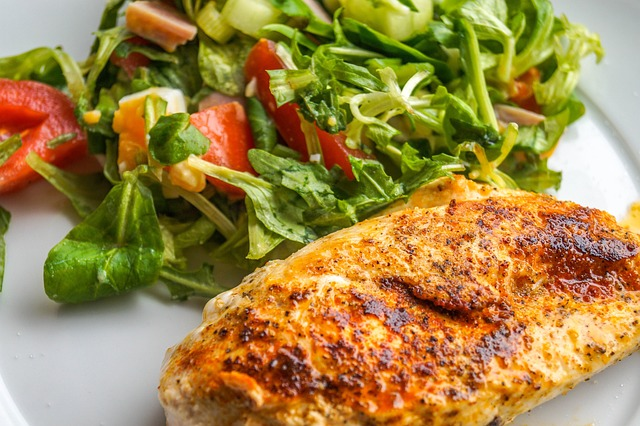Best High Protein Foods for Athletes
Athletes, whether they’re professional or just starting their fitness journey, know the importance of proper nutrition. A key component of an athlete’s diet is protein, which plays a vital role in muscle recovery, growth, and overall performance. In this article, we will explore the best high-protein foods for athletes and how to meet their protein needs. Right nutritional balance is also key to overall health.

Importance of Protein for Athletes
Before we dive into the best protein sources, it’s essential to understand why protein is crucial for athletes. Protein is not only a fundamental building block of muscles but also essential for other bodily functions. It aids in repairing and building tissues, supports immune function, and helps maintain healthy skin, hair, and nails. Protein is needed for the synthesis of anabolic hormone testosterone.
How Much Protein Do I Need
The protein intake for athletes vary based on factors such as activity level, type of sport, age, and gender. However, there are some general guidelines to consider.
Daily Protein Intake Guidelines
Recommended Dietary Allowance (RDA) provides a good reference for how much of a certain nutrient a healthy individual needs in a day. As a rule of thumb, athletes should aim for about 1.2 to 2.2 grams of protein per kilogram of body weight.
Endurance athletes might need closer to the lower end of that range, while those involved in strength training or bodybuilding may benefit from the higher end.
Factors Influencing Protein Needs
Factors like training intensity, duration, and frequency can influence your protein needs. Additionally, your individual metabolism and muscle mass will play a role in determining your daily protein intake.
Amino-Acids
Behind the scenes of the protein-rich foods, there’s a fascinating cast of characters known as amino acids. These are the building blocks of protein, and they’re responsible for crafting the body’s intricate structures. Amino acids are the unsung heroes, performing various roles in muscle repair, growth, and the overall functionality of the human body.
In essence, they’re the key players in the protein game, each with its own unique abilities. Just like assembling a puzzle, the body carefully arranges these amino acids to create the specific proteins it needs for various functions. So, as we explore the best high-protein foods for athletes, remember that it’s the amino acids within these foods that contribute to your success on the field, track, or gym floor.
Best Protein Sources
Beef
Lean cuts of beef are excellent sources of high-quality protein. They’re also rich in essential nutrients like iron, zinc, and B vitamins.
While premium cuts like sirloin or tenderloin can be a bit pricey, there are more budget-friendly options that offer great protein content.
Cuts like ground beef or flank steak are not only more affordable but also rich in protein. For those looking to optimize their protein intake without breaking the bank, lean ground beef or skirt steak are excellent choices.

Fish
Fish, particularly fatty fish like salmon and tuna, is a healthy protein source and heart-healthy omega-3 fatty acids. These nutrients can aid in reducing inflammation and enhancing recovery. It is recommended to eat at least one fish per week to maintain the correct ratio between omega-3 and omega-9.
While you can often find fish in your local grocery store, consider exploring nearby fish markets or seafood specialty stores. These local sources often offer a more extensive selection of fresh, sustainably sourced fish.
Canned tuna might be an option when traveling or camping with friends.

Eggs
Eggs are one of the best versatile protein sources. They’re a complete protein, containing all the essential amino acids your body needs.
It’s generally considered safe for athletes to consume 3-5 eggs per day, thanks to their active lifestyle and the body’s ability to efficiently absorb the nutrition provided by eggs.
Eggs were demonized due to their cholesterol content, but it’s important to note that there are two types of cholesterol, and eggs primarily contain the “good” HDL cholesterol. Recent research has shown that the impact of dietary cholesterol, such as that found in eggs, on blood cholesterol levels may be less significant than previously believed.

Poultry
Skinless chicken and turkey breast are lean sources of protein that are low in saturated fat. They’re great for muscle mass repair and growth. Lean poultry has one of the highest protein content among all meat.
Chicken breast, in particular, contains an impressive amount of protein per serving. You can often find high-quality, locally sourced chicken and turkey at farmer’s markets or local butcher shops. This not only supports local businesses but also ensures that you’re getting fresh, responsibly raised poultry to enhance your diet.

Dairy
Greek yogurt, cottage cheese, mozzarella, all dairy products, are rich in protein and offer essential calcium for strong bones. They’re not only nutritious but also convenient snacks, ideal for school or work.
However, it’s important to mention that those with lactose intolerance may need to opt for lactose-free dairy alternatives.

Nuts
When it comes to nuts, they offer more than just a satisfying crunch. Almonds, in particular, stand out as a protein-rich option that can significantly aid in recovery and growth. However, what makes almonds even more exceptional is their healthy fat content.
Many people like nut butters as a tasty alternative to nuts. For instance, peanuts, available in the form of 100% peanut butter, are excellent in protein content and healthy fats.

Plant-Based Options
For athletes following a vegetarian or vegan diet, there are plenty of plant-based protein sources like tofu, tempeh, legumes (beans, lentils, and chickpeas), and quinoa. These options are packed with protein and other essential nutrients.
Protein Powder
Protein powder supplements are a convenient way to meet your protein requirements, especially for those who struggle to get enough from whole foods. However, it’s essential to use them wisely and in combination with a balanced diet.
Generally, it is recommended to consume 1 to 2 (30g) protein scoops per day, when trying to meet your daily protein goals.
However, the key to using them effectively lies in choosing a high-quality brand. Not all protein powders are created equal, and opting for a reputable, well-sourced product ensures you get the most out of your supplement.
Are Protein Powders Worth It?
Protein powders can be beneficial, but they should complement your diet, not replace it. Protein shakes are excellent post-workout meals. These convenient shakes are not just beneficial for athletes; they are perfect for anyone on the go. Whether you’re dashing to a class, office, or simply in need of a quick, protein-packed snack.
Consider your overall dietary needs and fitness goals, and integrate protein powders into your meal plan accordingly. By striking the ideal equilibrium between whole foods and protein supplements, you can maximize their benefits without compromising on essential nutrients and a well-rounded diet.
Meal Planning
Meal planning is essential for those looking to meet their protein needs consistently. It helps ensure you’re getting the right balance of nutrients to support your training and recovery.
How to Plan Your Protein Intake
Plan your meals and snacks to include protein-rich foods. Include lean meats, fish, eggs, or plant-based options in every meal. You should aim to get around 20g of protein content in every meal.
You can distribute your protein intake among anywhere from 1 to 7 meals a day. Generally, it is considered best to consume around 5-6 meals per day.
Focus on the timing of your protein intake. Concentrate your protein consumption around the most active parts of your day, specifically a few hours before and right after your workout. Before exercise, protein acts as a steady source of energy, while post-workout, supports muscle massrecovery and growth.
By synchronizing your protein intake with your activity level, you can enhance your body’s performance and recovery capabilities.
Pre- and Post-Workout Nutrition
About an hour before your workout, consider incorporating carbohydrates into your pre-exercise meal. Carbs such as fruits, rice porridge, or oatmeal provide a quick source of energy and can help sustain your performance during the training session.
After your workout, your body is in an ideal state to replenish glycogen stores that were used during exercise. A protein shake, along with carbohydrates, can be the perfect post-workout combination. The protein assists in muscle recovery, while carbohydrates like fresh fruit help refill the glycogen stores, ensuring you’re prepared for your next training session.
Special Diets
People following special diets, such as vegan or vegetarian, can still meet their protein needs with careful planning.
Vegan Options
Vegan athletes can rely on plant-based protein sources like tofu, legumes, and quinoa to meet their protein targets. Be mindful of combining different plant-based proteins to ensure a complete amino acid profile.
It’s essential for vegan athletes to be mindful of the complementary nature of plant-based proteins. By combining different sources, such as beans and rice, or lentils and whole grains, they can ensure a complete amino acid profile.
This strategic pairing guarantees that they receive all the essential amino acids required for optimal muscle maintenance and performance.
Vegetarian Options
Vegetarians have the advantage of including dairy and eggs in their diet, making it easier to meet protein needs.
The versatility of dairy and eggs allows vegetarians to create a diverse and protein-rich menu, from omelets to Greek yogurt parfaits and cheesy vegetable dishes. Sunflower seeds are another food vegetarians can implement into their diet. These ingredients not only boost protein intake but also enhance the flavor and variety of vegetarian meals, making them an ideal choice for those who do not eat a lot of protein from animal sources.
Conclusion
In the realm of sports nutrition is the linchpin of success. Athletes, both experienced and novice, recognize the crucial role of protein in muscle mass recovery, growth, and overall health.
This comprehensive guide has mentioned a variety of high-protein food options, from lean beef to fish, eggs, poultry, dairy, nuts, plant-based sources, and protein powder supplements. The timing of protein intake, particularly around your most active hours, can significantly impact your performance and recovery.
Athletes following special diets, such as vegans and vegetarians, can confidently meet their protein needs with thoughtful planning. As you embark on your athletic journey, remember that the choices you make in the kitchen are the cornerstone of your success, propelling you toward your athletic aspirations.
Remember that individual needs may vary, so consider consulting a nutritionist or dietitian for personalized guidance.
You might also like to read this article.
